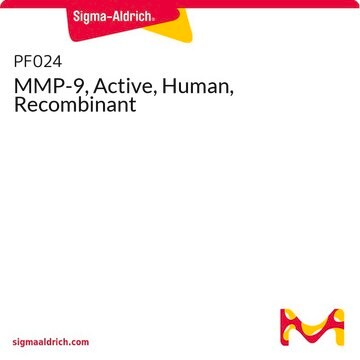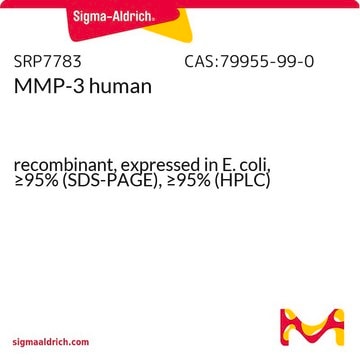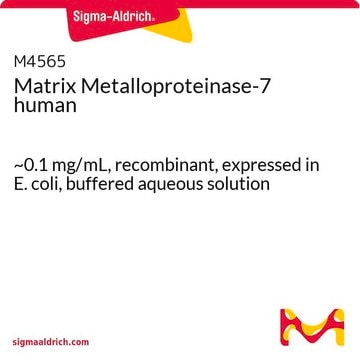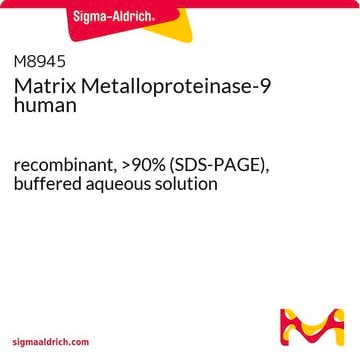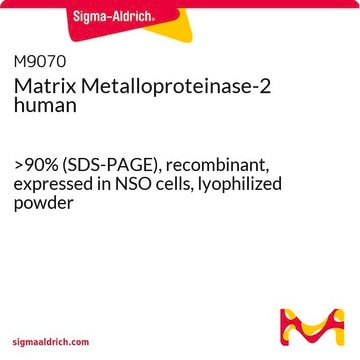推荐产品
一般說明
Matrix Metalloproteinase-2 (MMP-2) is a member of the matrix metalloproteinase (MMP) family of proteins. MMPs participate in the breakdown of extracellular matrix in normal physiological processes like embryonic development, reproduction, and tissue remodeling, as well as in disease processes such as arthritis and metastasis. MMP-2 cleaves many substrates, including extracellular matrix components (collagens, fibronectin, and elastin), soluble metabolic mediators (e.g., apolipoproteins), secreted and extracellular matrix-anchored growth factors, and cytokines.
Along with MMP-9, MMP-2 is involved many pathophysiological processes, including leukocyte migration from the circulation into the tissue during inflammation, Chagas′ Cardiomyopathy, heart failure and chronic kidney disease. MMP-2 thus may be regarded as a potential therapeutic target.
As with most MMPs, MMP-2 is secreted as an inactive pro-protein, which becomes activated when cleaved by extracellular proteinases. This product was pre-activated in vitro using 4-aminophenylmercuric acetate (APMA). Thus, it is active and ready for use. The highly toxic APMA was removed from the final preparation.
This product is expressed in human HEK 293 cells as a glycoprotein with a calculated molecular mass of 72 kDa (amino acids 110-660). The DTT-reduced protein migrates as a 75-80 kDa polypeptide on SDS-PAGE because of glycosylation. This protein is produced in human cells, without the use of serum. The human cells expression system allows human like glycosylation and folding, and often supports higher specific activity of the protein. This recombinant protein is expressed without artificial tags.
Along with MMP-9, MMP-2 is involved many pathophysiological processes, including leukocyte migration from the circulation into the tissue during inflammation, Chagas′ Cardiomyopathy, heart failure and chronic kidney disease. MMP-2 thus may be regarded as a potential therapeutic target.
As with most MMPs, MMP-2 is secreted as an inactive pro-protein, which becomes activated when cleaved by extracellular proteinases. This product was pre-activated in vitro using 4-aminophenylmercuric acetate (APMA). Thus, it is active and ready for use. The highly toxic APMA was removed from the final preparation.
This product is expressed in human HEK 293 cells as a glycoprotein with a calculated molecular mass of 72 kDa (amino acids 110-660). The DTT-reduced protein migrates as a 75-80 kDa polypeptide on SDS-PAGE because of glycosylation. This protein is produced in human cells, without the use of serum. The human cells expression system allows human like glycosylation and folding, and often supports higher specific activity of the protein. This recombinant protein is expressed without artificial tags.
特點和優勢
- Highly purified protein without artificial fusion tags
- Expressed in human cells (HEK 293) for proper glycosylation
- Pre-activated and ready to use
- High substrate activity
外觀
This product is supplied as a 0.22 μm-filtered solution, containing 20 mM Trizma®, pH 7.5, containing 8 mM CaCl2, 119 mM NaCl, 20% glycerol, and 0.05% Brij® 35.
儲存和穩定性
Store the product at –70 °C. The product retains its activity for at least 2 years as supplied. After initial thawing, it is recommended to store the protein in working aliquots at –70 °C.
其他說明
This product was pre-activated in vitro using 4-Aminophenylmercuric acetate (APMA). Thus, it is active and ready for use. In order to save our customers from handling hazardous materials, and for environmental saving, the highly toxic and fatal APMA was removed from the final preparation.
法律資訊
Brij is a registered trademark of Croda International PLC
Trizma is a registered trademark of Merck KGaA, Darmstadt, Germany
免責聲明
This product is for R&D use only. Not for drug, household, or other uses. Please consult the Safety Data Sheet for information regarding hazards and safe handling practices
儲存類別代碼
12 - Non Combustible Liquids
水污染物質分類(WGK)
WGK 1
閃點(°F)
Not applicable
閃點(°C)
Not applicable
M-J Hannocks et al.
Matrix biology : journal of the International Society for Matrix Biology, 75-76, 102-113 (2017-11-22)
This review focuses on the complementary roles of MMP-2 and MMP-9 in leukocyte migration into the brain in neuroinflammation, studied mainly in a murine model of experimental autoimmune encephalomyelitis (EAE) that has similarity to the human disease multiple sclerosis. We
Andrea Page-McCaw et al.
Nature reviews. Molecular cell biology, 8(3), 221-233 (2007-02-24)
Matrix metalloproteinases (MMPs) were discovered because of their role in amphibian metamorphosis, yet they have attracted more attention because of their roles in disease. Despite intensive scrutiny in vitro, in cell culture and in animal models, the normal physiological roles
Rugmani Padmanabhan Iyer et al.
American journal of physiology. Heart and circulatory physiology, 311(1), H190-H198 (2016-05-22)
Following myocardial infarction (MI), the left ventricle (LV) undergoes a series of cardiac wound healing responses that involve both the stimulation of robust inflammation to clear necrotic myocytes and tissue debris and the induction of extracellular matrix (ECM) protein synthesis
Zhengyuan Cheng et al.
International journal of molecular sciences, 18(4) (2017-04-12)
Gelatinases are members of the matrix metalloproteinase (MMPs) family; they play an important role in the degradation of the extracellular matrix (ECM). This effect is also crucial in the development and progression of chronic kidney disease (CKD). Its expression, as
Nayara I Medeiros et al.
Frontiers in immunology, 10, 800-800 (2019-05-07)
Background: Chagas cardiomyopathy is the main fibrosing myocarditis among known heart diseases. Development of cardiomyopathy has been related to extracellular matrix (ECM) remodeling, which are controlled by matrix metalloproteinases (MMPs) and cytokines, especially interleukin (IL)-1β. The convertion of 31KDa inactive
我们的科学家团队拥有各种研究领域经验,包括生命科学、材料科学、化学合成、色谱、分析及许多其他领域.
联系技术服务部门
